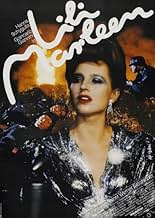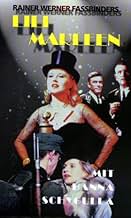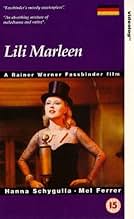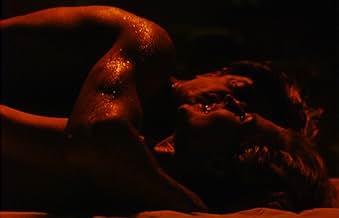IMDb-BEWERTUNG
7,1/10
4615
IHRE BEWERTUNG
1938 verliebt sich eine deutsche Sängerin in einen jüdischen Komponisten in Zürich, der Juden bei der Flucht aus Nazi-Deutschland hilft. Sie will helfen, wird aber zurück nach Deutschland ge... Alles lesen1938 verliebt sich eine deutsche Sängerin in einen jüdischen Komponisten in Zürich, der Juden bei der Flucht aus Nazi-Deutschland hilft. Sie will helfen, wird aber zurück nach Deutschland gezwungen.1938 verliebt sich eine deutsche Sängerin in einen jüdischen Komponisten in Zürich, der Juden bei der Flucht aus Nazi-Deutschland hilft. Sie will helfen, wird aber zurück nach Deutschland gezwungen.
- Auszeichnungen
- 1 Gewinn & 4 Nominierungen insgesamt
Karl-Heinz von Hassel
- Henkel
- (as Karl Heinz von Hassel)
Raúl Gimenez
- Blonsky
- (as Raul Giminez)
Empfohlene Bewertungen
10hasosch
Many critics have felt offended that R.W. Fassbinder has portrayed both protagonist Wilkie and the Nazis in this movie in a human-like manner. Connoisseurs of other Fassbinder films, however, will realize that "Lili Marleen" (1981) belongs to Fassbinder's "women movies" like "The Marriage of Maria Braun" (1979) and "Lola" (1981). Fassbinder was convinced that "stories can be told much better with women than with men", because, according to Fassbinder, while men usually fulfill their determined roles in society, "women are capable of thinking in a dialectic manner". Dialectics, however, means that there is not only a thesis and its antithesis like usually in our black-and-white world, but a synthesis where the oppositions coincide. Moreover, dialectic means that because of the third instance of synthesis the absolute opposition of the difference between thesis and antithesis is abolished. Concretely speaking: Starting from a dialect point of view and portraying the fascist state, the underground fighters must necessarily use the basic means like the rulers do, and between offenders and victims there is thus a chiastic relation, so that every offender is also victim and every victim is also offender. Fassbinder has illustrated this abstract scheme, that transcends classical logic, in his play "The City, the Garbage and the Death" (1975) which was filmed by Daniel Schmid under the title "Shadow of Angels" (1976).
Therefore, approaching an a priori controversial topic like Nazi Germany, in a dialectic manner, the depiction of this time in the form of a movie gets even more controversial, especially for people who cannot or do not want to see that our recognition of the world is by far not exhausted with a primitive light-switch schema, but needs the third instance of synthesis as controlling instance of its opposite members thesis and antithesis. The mutual relationship between offenders and victims has to scrutinized, since it is simply not true that the offenders are the bad ones and the victims the good ones. In a synthetic viewpoint, the bad ones participate on the goodness as the good ones participate on the badness. They are mutually related. In a world-view based on classical logic, a relation between good and bad cannot even been established, and in an ethics based on this insufficient system of logic, the bad conscience of the survivors of Nazi Germany, feeling (illogically enough) responsible for the deeds of their ancestors, exclude the possibility of a relationship between the two extremes and thus a synthesis in the form a new evaluation based on this relationship as well. From Fassbinder's dialectic viewpoint, it follows that neither Lili Marleen nor Lola nor Maria Braun can be condemned for their "misuse" of the ruling system for their private purposes, because they don't misuse them, they just use them. In the opposite, since victims must repeat the actions of the offenders as the offenders must repeat the actions of the victims, because "good" and "bad" are no longer simple mirror images of one another like in two-valued logic, their strategies are legitimated by the chiastic structure of a logic that describes our world, that is not black and white at all, much better than a black-and-white logic.
Therefore, approaching an a priori controversial topic like Nazi Germany, in a dialectic manner, the depiction of this time in the form of a movie gets even more controversial, especially for people who cannot or do not want to see that our recognition of the world is by far not exhausted with a primitive light-switch schema, but needs the third instance of synthesis as controlling instance of its opposite members thesis and antithesis. The mutual relationship between offenders and victims has to scrutinized, since it is simply not true that the offenders are the bad ones and the victims the good ones. In a synthetic viewpoint, the bad ones participate on the goodness as the good ones participate on the badness. They are mutually related. In a world-view based on classical logic, a relation between good and bad cannot even been established, and in an ethics based on this insufficient system of logic, the bad conscience of the survivors of Nazi Germany, feeling (illogically enough) responsible for the deeds of their ancestors, exclude the possibility of a relationship between the two extremes and thus a synthesis in the form a new evaluation based on this relationship as well. From Fassbinder's dialectic viewpoint, it follows that neither Lili Marleen nor Lola nor Maria Braun can be condemned for their "misuse" of the ruling system for their private purposes, because they don't misuse them, they just use them. In the opposite, since victims must repeat the actions of the offenders as the offenders must repeat the actions of the victims, because "good" and "bad" are no longer simple mirror images of one another like in two-valued logic, their strategies are legitimated by the chiastic structure of a logic that describes our world, that is not black and white at all, much better than a black-and-white logic.
The story of a song in Nazi Germany.. a fiction piece masterly created by Fassbinder. Whilst a stimulating watch, it feels editing could have been tighter at times.
Afterwards you can not get the song 'Lili Marleen' out of y head.
Best to watch the German version instead of the dubbed English one.
Even though Lili Marleen's events take place right before, during and up to the end of World War II, it is a movie centered around people and their feelings in typical Fassbinder fashion.
It is the story of Willie (played by the stunning Hanna Schygulla) and with her the story of Nazi Germany that follows a similar trajectory. She is a German that tries to make a living in Zurich as a singer/cabaret artist and falls in love with Robert (Giancarlo Giannini), a Jew and member of the anti-Nazi resistance camp. His family doesn't approve of their relationship, because she is German/Aryan and make sure they go their separate ways after her deportation. Back in Germany, she must find a way to survive and, seemingly out of nowhere, her song "Lili Marleen" becomes a monumental hit, a source of inspiration and courage for every German soldier, which brings Willie in a tricky spot, as it becomes harder and harder to maintain the balance between collaborating with the Nazis in an artistic level and taking part in the resistance against them all the while hoping for a reunion with Robert which seems more and more unlikely.
An interesting element of the movie is that it presents both sides in a nuanced way, it avoids portraying the Nazis as the one-dimensional caricature villains. It also shows how thin the lines are and how hard it can be to fight prejudice and shake off a social or political stigma.
And of course the song itself deserves its legendary status.
It is the story of Willie (played by the stunning Hanna Schygulla) and with her the story of Nazi Germany that follows a similar trajectory. She is a German that tries to make a living in Zurich as a singer/cabaret artist and falls in love with Robert (Giancarlo Giannini), a Jew and member of the anti-Nazi resistance camp. His family doesn't approve of their relationship, because she is German/Aryan and make sure they go their separate ways after her deportation. Back in Germany, she must find a way to survive and, seemingly out of nowhere, her song "Lili Marleen" becomes a monumental hit, a source of inspiration and courage for every German soldier, which brings Willie in a tricky spot, as it becomes harder and harder to maintain the balance between collaborating with the Nazis in an artistic level and taking part in the resistance against them all the while hoping for a reunion with Robert which seems more and more unlikely.
An interesting element of the movie is that it presents both sides in a nuanced way, it avoids portraying the Nazis as the one-dimensional caricature villains. It also shows how thin the lines are and how hard it can be to fight prejudice and shake off a social or political stigma.
And of course the song itself deserves its legendary status.
I am terribly sorry, I know that Faßbinder still is called one of the greatest directors in post-war Germany and that most of his films are considered "master-pieces", but when I see "Lili Marleen" today, in 2004, I wonder what everyone is up and away about this movie! The acting is simply terrible - Hanna Schygulla is all the smiling like an idiot! -, the changings between Nazi-glamour and battlefields are ridiculous, the whole film looks as if it was made within two days in an attic. Probably it was exactly that way and many people seem to take this for "real art", but for me this movie is simply bad & cheap. Compare this to Viscontis "La Caduta degli Dei" and tell me again that "Lili Marleen" is a good movie...
Rainer Werner Fassbinder is an important (or maybe the most important) director of the "Neue Deutsche Welle" of the seventies and eighties.
Until now I had seen only one of his films ("Angst essen Seele auf", 1974), preferring another director of the "Neue Deutsche Welle" (Werner Herzog) instead.
Also with other filmmovements I often prefer another director above the leading figure. With the French "Nouvelle vague" for example I prefer Claude Chabrol above Jean Luc Godard.
Nevertheless only one film of such an important director felt as too little to me and I decided to watch some more if the opportunity arose.
The first opportunity was "Lili Marleen" (1981) and maybe this was not the best oppurtunity. "Lily Marleen" is from the later stages of Fassbinder's career. He was already a renowned director and for this production had the disposal over a big budget. His aim was a film that would also perform well at the American box office. The film was recorded in English but later dubbed in German when the American success failed to materialize.
The story is about the female singer Willie (Hanna Schygulla) who is very successful in Nazi circles, being with the resistance in her private life. As such the story has similarities with "Black book" (2006, Paul Verhoeven).
The song Willie has success with is "Lili Marleen", which was a real existing song during the Second World War performed by Lale Andersen. Also Marlene Dietrich would occasionaly perform this song.
In my opinion "Lili Marleen" is a rather conventional movie according to Fassbinder standards (or at least as I expect Fassbinder standards to be). The most striking scenes are those in which Willie is performing her song. These scenes are edited with both images of soldiers resting in their trenches and very brutal war violence. These scenes are however more theatrical than shocking.
Until now I had seen only one of his films ("Angst essen Seele auf", 1974), preferring another director of the "Neue Deutsche Welle" (Werner Herzog) instead.
Also with other filmmovements I often prefer another director above the leading figure. With the French "Nouvelle vague" for example I prefer Claude Chabrol above Jean Luc Godard.
Nevertheless only one film of such an important director felt as too little to me and I decided to watch some more if the opportunity arose.
The first opportunity was "Lili Marleen" (1981) and maybe this was not the best oppurtunity. "Lily Marleen" is from the later stages of Fassbinder's career. He was already a renowned director and for this production had the disposal over a big budget. His aim was a film that would also perform well at the American box office. The film was recorded in English but later dubbed in German when the American success failed to materialize.
The story is about the female singer Willie (Hanna Schygulla) who is very successful in Nazi circles, being with the resistance in her private life. As such the story has similarities with "Black book" (2006, Paul Verhoeven).
The song Willie has success with is "Lili Marleen", which was a real existing song during the Second World War performed by Lale Andersen. Also Marlene Dietrich would occasionaly perform this song.
In my opinion "Lili Marleen" is a rather conventional movie according to Fassbinder standards (or at least as I expect Fassbinder standards to be). The most striking scenes are those in which Willie is performing her song. These scenes are edited with both images of soldiers resting in their trenches and very brutal war violence. These scenes are however more theatrical than shocking.
Wusstest du schon
- WissenswertesShot in English for American distribution; later dubbed in German
- PatzerKaufmann, the German officer who arrests Robert on the train, wears the uniform of an SS-Gruppenfuhrer (General) - it is highly unlikely that an SS General of such rank would be checking identity papers at random on a train.
- SoundtracksLili Marleen
(German Version)
(based on a poem from the 1915 book "Die kleine Hafenorgel" by Hans Leip)
Music By Norbert Schultze,
Vocals Hanna Schygulla
(p) 1981 Schlicht Musikverlag, Phonogram, GmbH, DRG Records, Inc., Philips
© Metropolis Records
Published By Brampton Music Ltd., Chappell Music Ltd., Peter Maurice Music,
EMI Music
Top-Auswahl
Melde dich zum Bewerten an und greife auf die Watchlist für personalisierte Empfehlungen zu.
- How long is Lili Marleen?Powered by Alexa
Details
- Erscheinungsdatum
- Herkunftsland
- Sprachen
- Auch bekannt als
- La vida íntima de Lili Marleen
- Drehorte
- Produktionsfirmen
- Weitere beteiligte Unternehmen bei IMDbPro anzeigen
Box Office
- Budget
- 10.500.000 DM (geschätzt)
- Bruttoertrag in den USA und Kanada
- 8.144 $
- Eröffnungswochenende in den USA und in Kanada
- 11.623 $
- 16. Feb. 2003
- Weltweiter Bruttoertrag
- 8.158 $
- Laufzeit
- 2 Std.(120 min)
- Sound-Mix
- Seitenverhältnis
- 1.66 : 1
Zu dieser Seite beitragen
Bearbeitung vorschlagen oder fehlenden Inhalt hinzufügen


































